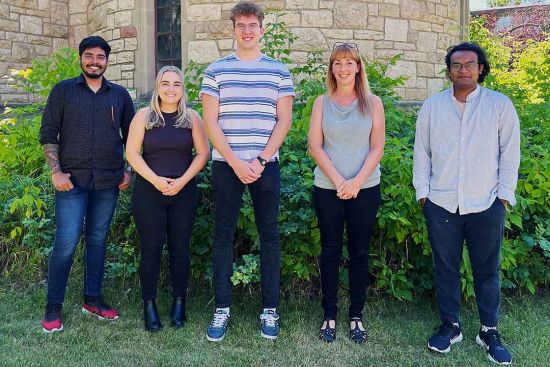 A USask College of Medicine research team including Saurav Rout, Maddie Stewart, Nathan Seidel, Dr. Kerry Lavender (PhD), and Satyajit Biswas is studying new treatments for HIV infection. (Photo: Submitted)
A USask College of Medicine research team including Saurav Rout, Maddie Stewart, Nathan Seidel, Dr. Kerry Lavender (PhD), and Satyajit Biswas is studying new treatments for HIV infection. (Photo: Submitted)
USask research teams to test treatments for eliminating HIV infection, fibrotic diseases
Research to explore the effectiveness of innovative targeted treatments for HIV infections, and the use of protein therapy to break down fibrous scar tissue are two of five new University of Saskatchewan (USask) projects awarded a total of $3.3 million in federal funding. Aug 30, 2022
The Canadian Institutes of Health Research (CIHR) provided the funds under its Project Grant program, which supports research that advances health-related knowledge, health care, health systems, and/or health outcomes.
Fighting HIV infections with improved targeted treatments
The human immunodeficiency virus (HIV) has infected 37 million people in the world, causing approximately one million deaths annually. The transmissible virus has no cure, with only minimal treatment options.
Now, a research team led by Dr. Kerry Lavender (PhD), an assistant professor in USask’s College of Medicine, aims to use its CIHR award of $879,750 to develop a more targeted viral treatment toward curing AIDS caused by HIV infections rather than suppress the effects of HIV. Lavender has also been awarded a supplemental $100,000 for early career investigators with the highest-ranking projects whose research focuses on pandemic preparedness and health emergencies.
“Currently, the only effective means of treating HIV-1 involves the use of antiretroviral therapy (ART) regimens,” said Lavender.
“ART suppresses viral replication and prevents the progression of the virus into AIDS, thus extending patients’ lives. Developing new strategies to eliminate the HIV reservoir and cure the infection are a global priority.”
Because current ART treatment regimens only reduce active virus replication and do not eliminate HIV from the body, those living with HIV need lifelong treatment, which is costly. Lavender’s team will investigate how antiviral immune mediators, called interferon (IFN)-alpha subtypes, can be better used to treat infections such as HIV.
For example, a specific IFN-alpha subtype was used in the past to successfully treat Hepatitis C infection. Lavender’s team has shown a different subtype is more potent than others at controlling HIV infection. It seems to work by “supercharging” Natural Killer (NK) cells whose job is to find, target and kill virus-infected cells. The researchers will examine exactly how the subtype boosts NK cells.
“We will use this knowledge to harness these effects and incorporate them into new therapeutic strategies to significantly reduce, or even completely eliminate, HIV infected cells from the body,” said Lavender.
Blocking Fibrosis and scar tissue formation using protein-based peptide therapy
With five-year CIHR funding of $1.04 million, USask College of Dentistry Professor Dr. Andrew Leask (PhD) is researching ways to reduce the occurrence of fibrotic diseases, which currently account for almost 45 per cent of health care costs in developed nations.
Fibrotic diseases such as diabetes, lung fibrosis and cancers are characterized by the excessive buildup of collagen-rich scar tissue, which results in the loss of tissue function.
For people who suffer from scleroderma—a fibrotic, autoimmune disease in which dense scar tissue can collect in the skin, lungs, kidney and esophagus—the condition can cause loss of mobility, pain, disfigurement, and death.
Leask is investigating the mechanisms of a potential protein therapy that could be broadly used to treat fibrotic diseases, which currently have extremely limited treatment options.
“This CIHR grant will allow us to begin to test if BLR-200, a peptide molecule, can block or reverse the fibrosis seen in scleroderma,” said Leask. “Our studies on this peptide, combined with our ongoing work on this critical area of research, should allow us to identify the fundamental mechanisms underlying fibrotic conditions, in general.”
Following the funded investigation, the Leask research team together with Dr. Bruce Riser (PhD), CEO of biotechnology company BLR Bio, plans to design and begin clinical trials using BLR-200 to treat scleroderma, and then move on to other diseases such as lung fibrosis, solid tumour cancers, melanoma, long COVID, and fatty liver disease.
See outlines for other funded projects here.
Media Contact
Victoria Dinh
Media Relations Specialist
University of Saskatchewan
University Relations
Ph: 306-966-5487
victoria.dinh@usask.ca
Source: https://news.usask.ca/articles/research/2022/usask-research-teams-to-test-treatments-for-eliminating-hiv-infection,-fibrotic-diseases.php
"Reproduced with permission - University of Saskatchewan"
University of Saskatchewan
For more HIV and AIDS News visit...
Positively Positive - Living with HIV/AIDS:
HIV/AIDS News
|